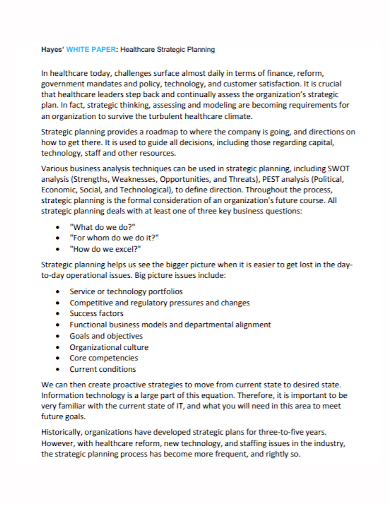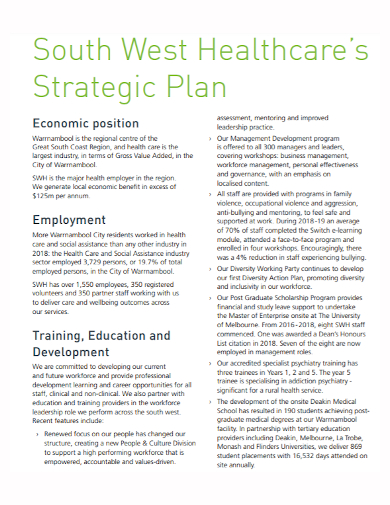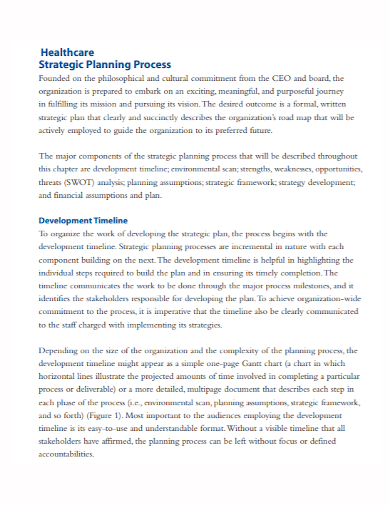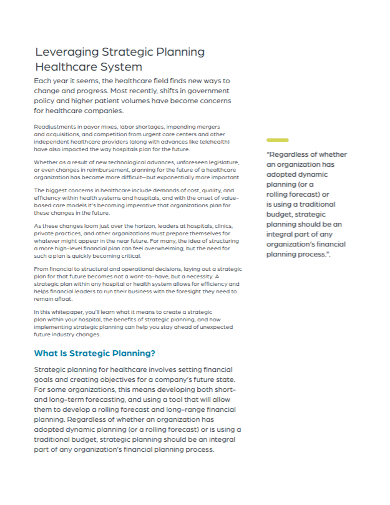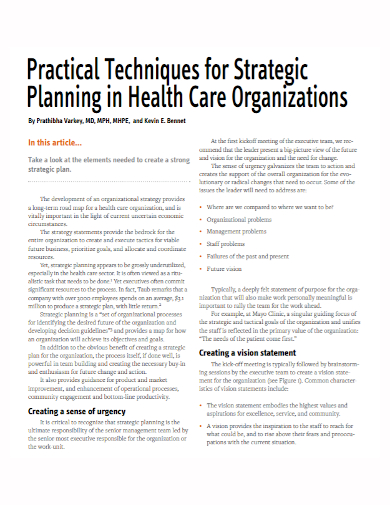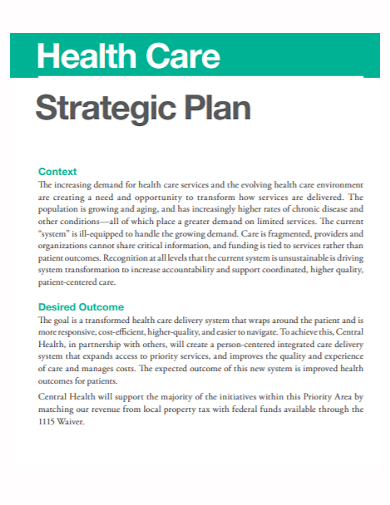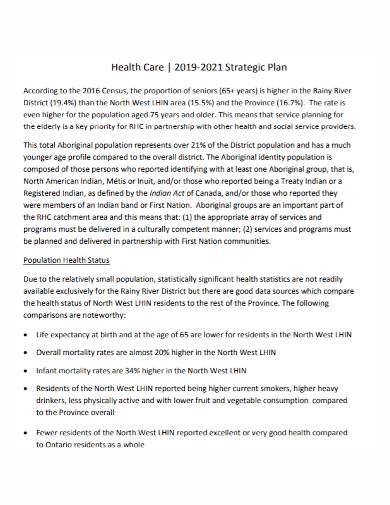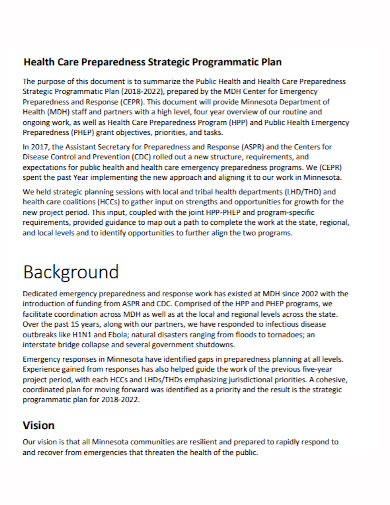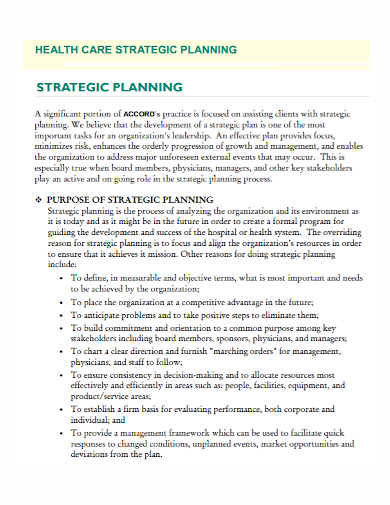In healthcare organizations, strategic planning entails laying out the specific steps that must be taken to achieve specific objectives. While there are various types and levels of strategy, the goal of all strategies is to align an organization’s actions with its stated mission or values. Today’s healthcare practitioners need more patient-centered, value-based methods, yet many of their present systems are built on older, more traditional strategy models. Organizations are increasingly needing to re-calibrate their health-care plans to fit current market trends and evolving patient-care techniques. Any professional interested in learning more about the inner workings of healthcare organizations should be aware of the various types of strategies employed in the field, as well as their significance in ensuring an organization’s success.
In healthcare organizations, strategic planning entails setting objectives and goals for where the organization wants to go in the long run. You can make a plan to achieve these goals and objectives if you keep them in mind. You can’t simply define goals and objectives based on your requirements. You must also adjust them to reflect current economic conditions, political policies, and technological improvements. For healthcare companies to prosper, strategic planning is essential. Understanding how your company works is crucial to developing a successful strategic plan for the overall healthcare system. You may need to examine your organization’s hierarchy from time to time.
10+ Healthcare Strategic Plan Samples
1. Healthcare Strategic Plan Template
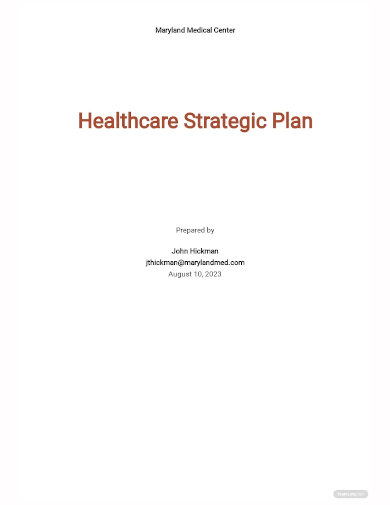
2. Healthcare HR Strategic Plan Template

3. Healthcare Strategic Plan
4. Sample Healthcare Strategic Plan
5. Healthcare Development Strategic Plan
6. Healthcare System Strategic Plan
7. Healthcare Organization Strategic Plan
8. Standard Healthcare Strategic Plan
9. Basic Healthcare Strategic Plan
10. Healthcare Strategic Programmatic Plan
11. Printable Healthcare Strategic Plan
Importance of Strategic Planning in Healthcare
- Improved communication among all chains – Departments at all levels can easily become perplexed about what’s going on. Employees and stakeholders alike want to make sure that your company has a long-term future. They want to know where your company is going and how you plan to get there. In healthcare administration, effective planning can help you generate clarity and improve communication. The primary concerns, your organization’s vision, and goals, and the steps to get there should all be addressed in your strategic plan. Your employees and stakeholders will have more trust and confidence in your company.
- Being able to develop and share a vision – With this in mind, you may have a positive impact at all levels of your company. Employees will be dedicated and driven to assist you in realizing your goals. Stakeholders will be able to make sound financial decisions with the confidence and clarity they require. Strategic planning for well-developed healthcare facilities, implemented, and communicated may assist each of your employees in carrying out your long-term goal for a prosperous future.
- More employee motivation and engagement – Every one of your employees wishes to be noticed and heard. Recognition from their superiors can have a significant impact on their productivity, engagement, and safety management. Every employee wishes to be given the authority to make decisions that will benefit the company. This also encourages them to go above and beyond the job description or performance evaluation’s minimal acceptable requirements. Employees will be unmotivated to develop themselves if their employer has a clear goal and a well-executed game plan.
- Leadership and authority – Transformational leadership is a style of management that motivates employees to work harder and achieve greater results. It contains strategies that have been recognized in the literature on organizational behavior. Transformational leaders can properly express their organization’s goal, believe in their staff, and achieve high levels of performance. Strategic management requires you to help your staff understand how their positions can contribute to your organization’s purpose and vision.
- Team cooperation and collaboration – To provide high-quality healthcare, team teamwork and cooperation are vital. Employees must collaborate for your company to succeed. Every healthcare industry needs to work together to improve its performance and service. In the healthcare industry, effective strategic planning models can bring your employees together to produce high-quality care, excellent customer service, and enhanced productivity.
FAQs
What are the known strategy types?
It involves prospective strategy and emergent strategy. Prospective policies should also allow for flexibility in the event of unanticipated healthcare changes. Emergent strategies, on the other hand, entail a retrospective examination of occurrences in order to make better decisions in the future.
What are the strategy levels within organizations?
It includes corporate-level strategy, business-level strategy, and functional-level strategy.
Before sharing your strategic strategy with your staff, give it some thought. A well-thought-out and implemented strategic plan can help to promote teamwork, performance responsibility, and employee engagement. You can quickly achieve your organization’s long-term goals if all levels work together in harmony.
Related Posts
FREE 4+ 30-60-90-Day Marketing Plan Samples in MS Word | Google Docs | Apple Pages | PDF
FREE 10+ Higher Education Lesson Plan Samples in MS Word | Pages | Google Docs | PDF
FREE 9+ 30-Day Marketing Plan Samples in PDF | MS Word | Apple Pages | Google Docs
FREE 3+ Sales Team Action Plan Samples in PDF | MS Word | Apple Pages | Google Docs
Marketing Plan For Small Business Samples
FREE 7+ Fashion Business Plan Samples in PDF
FREE 10+ Sprint Planning Samples In MS Word | Google Docs | PDF
FREE 10+ Wedding Planning Samples in MS Word | Apple Pages | Powerpoint | PDF
FREE 9+ Monthly Study Planner Samples in PSD | Illustrator | InDesign | PDF
FREE 9+ Sample Curriculum Planning Templates in PDF | MS Word
FREE 10+ Teacher Development Plan Samples in MS Word | Google Docs | Apple Pages | PDF
FREE 10+ Basketball Practice Plan Samples in PDF
FREE 12+ School Business Plan Samples in PDF | MS Word | Apple Pages | Google Docs
FREE 7+ Client Strategic Plan Samples in PDF | MS Word
FREE 11+ Trucking Business Plan Templates in PDF | MS Word | Google Docs | Pages

